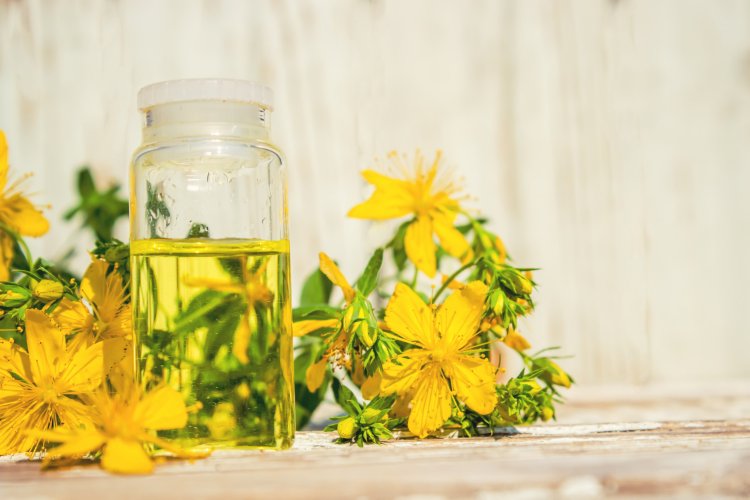St. John's Wort Oil: Varieties, Benefits, Applications, and Precautions
St. John's Wort oil, extracted from the Hypericum perforatum plant, is renowned for its therapeutic properties and has been utilized for centuries in traditional medicine and skincare. This comprehensive guide delves into the various aspects of St. John's Wort oil, including its types, extensive benefits, versatile applications, and important precautions.

Types of St. John's Wort Oil
St. John's Wort oil can be derived from different parts of the Hypericum perforatum plant, resulting in distinct varieties with varying compositions and properties:
-
St. John's Wort Flower Oil: Extracted solely from the flowers of the Hypericum perforatum plant, this type of oil is prized for its delicate aroma and lighter consistency. It is commonly used in aromatherapy and cosmetic formulations.
-
St. John's Wort Leaf Oil: Obtained from the leaves of the Hypericum perforatum plant, this oil possesses a richer concentration of active compounds and is favored for its potent medicinal properties. It is often employed in therapeutic ointments and herbal remedies.
-
St. John's Wort Extract: This concentrated formulation is derived from both the flowers and leaves of the Hypericum perforatum plant using extraction methods involving solvents like alcohol or water. It encapsulates the full spectrum of bioactive constituents and is utilized in various medicinal preparations.
Benefits of St. John's Wort Oil
St. John's Wort oil boasts a myriad of health benefits attributed to its diverse array of bioactive compounds, including flavonoids, hypericin, and hyperforin. Here are some of its notable benefits:
-
Antioxidant Activity: St. John's Wort oil exhibits potent antioxidant properties, scavenging free radicals and protecting cells from oxidative damage, thereby promoting overall health and vitality.
-
Anti-inflammatory Effects: The oil's anti-inflammatory properties help alleviate symptoms associated with inflammatory conditions such as arthritis, dermatitis, and gastrointestinal disorders, providing relief and comfort.
-
Wound Healing: St. John's Wort oil accelerates the healing process of wounds, cuts, and burns by stimulating tissue regeneration and reducing inflammation, leading to faster recovery and minimized scarring.
-
Mood Enhancement: Regular use of St. John's Wort oil may help alleviate symptoms of mild to moderate depression and anxiety, promoting emotional well-being and psychological resilience.
-
Skin Care: St. John's Wort oil is beneficial for various skin conditions, including acne, eczema, and psoriasis, due to its antimicrobial, anti-inflammatory, and skin-soothing properties, fostering healthy and radiant skin.
Applications and Usage of St. John's Wort Oil
St. John's Wort oil offers versatile applications and can be incorporated into daily wellness routines in several ways:
- Topical Application: Apply St. John's Wort oil directly to the skin to target specific concerns such as wounds, bruises, or inflammatory skin conditions. It can be used alone or blended with carrier oils or other skincare ingredients for customized formulations.
- Massage Therapy: Utilize St. John's Wort oil as a massage oil to relieve muscular tension, soothe sore muscles, and promote relaxation and stress relief. Combine it with complementary essential oils for enhanced therapeutic effects.
- Hair and Scalp Care: Massage St. John's Wort oil into the scalp to nourish the hair follicles, strengthen the hair shaft, and improve overall scalp health. It can also be added to homemade hair masks or incorporated into commercial hair care products for added benefits.
- Aromatherapy: Diffuse St. John's Wort oil in an aromatherapy diffuser to create a calming and uplifting atmosphere, ideal for promoting relaxation, enhancing mood, and reducing stress and tension. Alternatively, add a few drops of the oil to bathwater for a rejuvenating and aromatic bath experience.
Precautions and Considerations
While St. John's Wort oil offers numerous health benefits, it is essential to exercise caution and adhere to certain precautions to ensure safe and effective usage:
- Skin Sensitivity: Some individuals may experience skin sensitivity or allergic reactions to St. John's Wort oil, particularly those with sensitive skin or allergies to plants in the Hypericaceae family. Perform a patch test before applying the oil to a larger area of the skin.
- Photosensitivity: St. John's Wort oil can increase the skin's sensitivity to sunlight, potentially leading to sunburns or skin irritation. Avoid prolonged exposure to sunlight or ultraviolet (UV) radiation when using the oil topically, and apply sunscreen or protective clothing as needed.
- Drug Interactions: St. John's Wort oil may interact with certain medications, including antidepressants, oral contraceptives, blood thinners, and immunosuppressants, altering their efficacy or increasing the risk of side effects. Consult with a healthcare professional before using St. John's Wort oil, especially if you are taking prescription medications or have underlying health conditions.
- Pregnancy and Lactation: Pregnant or breastfeeding women should avoid using St. John's Wort oil without consulting a healthcare provider, as its safety and potential effects on maternal and fetal health have not been adequately studied.
- Quality and Purity: Ensure that you purchase St. John's Wort oil from reputable sources that adhere to stringent quality standards and employ proper extraction methods to guarantee purity, potency, and safety.
In summary, St. John's Wort oil is a versatile and beneficial natural remedy with a wide range of applications in skincare, wellness, and holistic medicine. By understanding its diverse benefits, proper usage techniques, and potential precautions, individuals can harness the therapeutic potential of this herbal extract while ensuring their safety and well-being.
#StJohnsWort #NaturalRemedy #HolisticHealth #HerbalMedicine #Skincare #Wellness #Aromatherapy #MassageTherapy #HairCare #ScalpCare #Aromatherapy #Precautions #HealthTips
Disclaimer:
The information provided in this article is for educational purposes only and should not be considered medical advice. If you have any health concerns or are experiencing symptoms, it is important to consult with a healthcare professional, such as a doctor or clinic, for proper diagnosis and treatment. Always seek the advice of your doctor or other qualified health provider with any questions you may have regarding a medical condition. Do not disregard professional medical advice or delay in seeking it because of something you have read in this article.
What's Your Reaction?





















